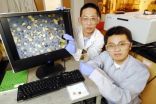(Press-News.org) PHILADELPHIA — An investigational DNA methylation test could alter the screening landscape for colorectal cancer, according to data presented at the American Association for Cancer Research special conference on Colorectal Cancer: Biology to Therapy, held here Oct. 27-30, 2010.
Colorectal cancer is the third leading cause of cancer, and the second leading cause of cancer mortality. While celebrities continue to undergo public colonoscopies in an effort to increase awareness, only 60 percent of adults age 50 and older have undergone recommended screening, according to the Centers for Disease Control and Prevention.
David Ahlquist, M.D., professor of medicine and a consultant in gastroenterology at the Mayo Clinic in Rochester, said much of that low rate may be due to inconveniences associated with conventional approaches.
"There is definitely an incentive and legitimate justification to be designing a screening approach that is user friendly, affordable and has the ability to detect pre-cancers," said Ahlquist. "The noninvasive stool DNA test we have developed is simple for patients, involves no diet or medication restriction, no unpleasant bowel preparation, and no lost work time, as it can be done from home. Positive tests results would be followed up with colonoscopy."
The test that Ahlquist and colleagues evaluated is under development by Exact Sciences, a molecular diagnostics company in Wisconsin.
The test, which is not yet approved by the FDA, is conducted using a stool sample and works by detecting tumor-specific DNA alterations in cells that are shed into the stool from pre-cancerous or cancerous lesions.
In this first clinical validation study presented at the AACR conference, which included 1,100 patients, the researchers detected 64 percent of precancerous adenomas greater than 1 cm and 85 percent of cancers. Polyps over 1 cm are considered the most likely to progress. Furthermore, cancers and precancerous adenomas were detected equally well on both sides of the colon.
Colorectal cancer rate detection was 87 percent for cancers considered to be in the most curable stage (stage I-III) and 69 percent for the most advanced stage (stage IV).
Further clinical trials are planned for next year, according to Exact Sciences.
INFORMATION:
Under an exclusive license agreement with Mayo, Exact has rights to intellectual property developed by Ahlquist and Mayo Clinic. Exact will make up-front, milestone and royalty payments to Mayo Clinic, which will be shared with Ahlquist in accordance with Mayo Clinic's Royalty Sharing Policy and will also provide funding for future work in Ahlquist's lab.
The mission of the American Association for Cancer Research is to prevent and cure cancer. Founded in 1907, the AACR is the world's oldest and largest professional organization dedicated to advancing cancer research. The membership includes 32,000 basic, translational and clinical researchers; health care professionals; and cancer survivors and advocates in the United States and more than 90 other countries. The AACR marshals the full spectrum of expertise from the cancer community to accelerate progress in the prevention, diagnosis and treatment of cancer through high-quality scientific and educational programs. It funds innovative, meritorious research grants, research fellowships and career development awards. The AACR Annual Meeting attracts more than 18,000 participants who share the latest discoveries and developments in the field. Special conferences throughout the year present novel data across a wide variety of topics in cancer research, treatment and patient care. The AACR publishes six major peer-reviewed journals: Cancer Research; Clinical Cancer Research; Molecular Cancer Therapeutics; Molecular Cancer Research; Cancer Epidemiology, Biomarkers & Prevention; and Cancer Prevention Research. The AACR also publishes CR, a magazine for cancer survivors and their families, patient advocates, physicians and scientists, providing a forum for sharing essential, evidence-based information and perspectives on progress in cancer research, survivorship and advocacy.
New test measures DNA methylation levels to predict colon cancer
2010-10-29
ELSE PRESS RELEASES FROM THIS DATE:
Scientists describe new approach for identifying genetic markers for common diseases
2010-10-29
La Jolla, CA, October 28, 2010 – For Immediate Release – A group of researchers at The Scripps Research Institute and the Scripps Translational Science Institute has published a paper that reviews new strategies for identifying collections of rare genetic variations that reveal whether people are predisposed to developing common conditions like diabetes and cancer.
In our modern genetic age, the entire DNA sequences, or "genomes," of humans and thousands of other animals, plants, and microbial life forms have been completely decoded and are publicly available to scientists ...
Rictor protein offers scientists a new molecular target for cancer therapies
2010-10-29
BOSTON – The discovery that a protein called Rictor plays a key role in destroying a close cousin of the AKT oncogene could provide scientists with a new molecular target for treating certain cancers, including breast cancer. Described in the September 2010 issue of the journal Molecular Cell, the study was led by scientists at Beth Israel Deaconess Medical Center (BIDMC).
The oncogenic cousin, known as SGK1, resembles the widely known AKT oncogene in structure, according to the study's senior author Wenyi Wei, PhD, of the Department of Pathology at BIDMC and Assistant ...
Insulin-creating cell research may lead to better diabetes treatment
2010-10-29
LIVERMORE, Calif. – Beta cells, which make insulin in the human body, do not replicate after the age of 30, indicating that clinicians may be closer to better treating diabetes.
Type 1 diabetes is caused by a loss of beta cells by auto-immunity while type 2 is due to a relative insufficiency of beta cells. Whether beta cells replicate after birth has remained an open issue, and is critically important for designing therapies for diabetes.
By using radioactive carbon-14 produced by above-ground nuclear testing in the 1950s and '60s, researchers have determined that the ...
Organic solvent system may improve catalyst recycling and create new nanomedicine uses
2010-10-29
Noble metals such as platinum and palladium are becoming increasingly important because of growth in environmentally friendly applications such as fuel cells and pollution control catalysts. But the world has limited quantities of these materials, meaning manufacturers will have to rely on efficient recycling processes to help meet the demand.
Existing recycling processes use a combination of two inorganic acids known as "aqua regia" to dissolve noble metals, a class of materials that includes platinum, palladium, gold and silver. But because the metals are often dissolved ...
A recent IRCM breakthrough impacts cancer research
2010-10-29
Montreal, October 28, 2010 – A team of scientists at the Institut de recherches cliniques de Montréal (IRCM) led by Dr. Jean-François Côté, Director of the Cytoskeletal Organization and Cell Migration research unit, identified a novel molecular mechanism in the control of cell motility. Their findings were published online today in Current Biology, a journal from the Cell Press group. This scientific breakthrough could eventually lead to the development of new cancer-treating drugs that could block the spread of tumours (metastasis).
"As many as 90% of cancer patient ...
Spacecraft will enable scientists to study space environment around moon, Earth
2010-10-29
Two spacecraft are now beginning to study the moon's environment as part of NASA's ARTEMIS mission, whose principal investigator is Vassilis Angelopoulos, a UCLA professor of Earth and space sciences.
One of these satellites has been in the lunar environment since Aug. 25, and the second arrived Oct. 22, marking the start of the ARTEMIS mission to gather new scientific data in the sun-Earth-moon environment.
ARTEMIS is an acronym for Acceleration, Reconnection, Turbulence and Electrodynamics of the Moon's Interaction with the Sun.
For roughly six months, the ...
Immigrant Latinos in rural Illinois have unique child care needs
2010-10-29
URBANA – Finding good child care and being able to engage easily in important interactions with your child care provider are critical to any mother's ability to work outside the home.
"Suppose you're living in the rural Midwest and you don't speak English very well. Can you imagine leaving your child with a child care provider if you couldn't communicate well with that person?" said Angela Wiley, a University of Illinois associate professor of applied family studies.
"The immigrant moms we interviewed for this study faced just this dilemma," she said.
Immigrant Latino ...
Newly discovered regulatory mechanism essential for embryo development and may contribute to cancer
2010-10-29
Researchers from Mount Sinai School of Medicine have identified a mechanism controlling the function of a protein that binds to DNA during embryonic development and may function to prevent abnormal tumor growth. When the protein, TCF3, is modified by a small molecule called a phosphate, it no longer binds DNA, changing the way the protein signals during development. This discovery identifies a new diagnostic marker (phosphorylated TCF3) that may be associated with cancer and could represent a potential drug target. The results are published in the current issue of Developmental ...
UM researchers are studying child-mother interactions to design robots with social skills
2010-10-29
CORAL GABLES, FL (October 28, 2010)—To help unravel the mysteries of human cognitive development and reach new the frontiers in robotics, University of Miami (UM) developmental psychologists and computer scientists from the University of California in San Diego (UC San Diego) are studying infant-mother interactions and working to implement their findings in a baby robot capable of learning social skills.
The first phase of the project was studying face-to-face interactions between mother and child, to learn how predictable early communication is, and to understand what ...
Wild Scottish sheep could help explain differences in immunity
2010-10-29
Strong immunity may play a key role in determining long life, but may do so at the expense of reduced fertility, a Princeton University study has concluded.
An 11-year study of a population of wild sheep located on a remote island off the coast of Scotland that gauged the animals' susceptibility to infection may give new insight into why some people get sicker than others when exposed to the same illness.
The answer to this medical puzzle may lie in deep-rooted differences in how animals survive and reproduce in the wild, according to the study, which was led by Princeton ...

